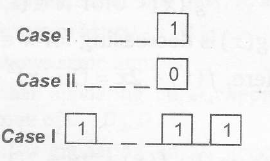Answer:
Option B
Explanation:
Since $a_{n}$ be the n-digit positive integer formed by the digits 0,1 or both such that no two consecutive digits are zero.
$b_{n}$=numbers which are ending with 1
$C_{n}$= number which are ending with 0
$\therefore$ $a_{n}=b_{n}+c_{n}$
i.e, $a_{n}$=1(0 or 1)...............(0 or 1)
$b_{n}=$1 (0 or 1) ........1
nth place
$c_{n}$=1(0 or 1) ......0
$b_{6}$= Six digit number ending with 1

Now, the four places are to be filled
i,e,
For 3 places, all 1's are used =1 way
one zero is used= $^{3}C_{1}$=3
two zeros are used=1 way
0 1 0 1 ............
Total=5 ways

for 3 places,
all 1's are used =1ways
one zero is used = $^{2}C_{1}$=2 ways
---------------------
=3 ways
------------------
Thus, $b_{6}=5+3=8$